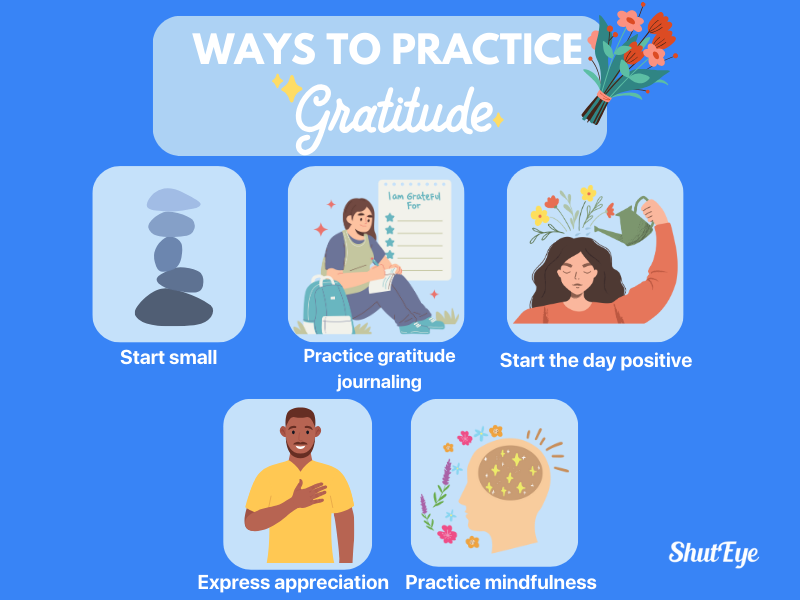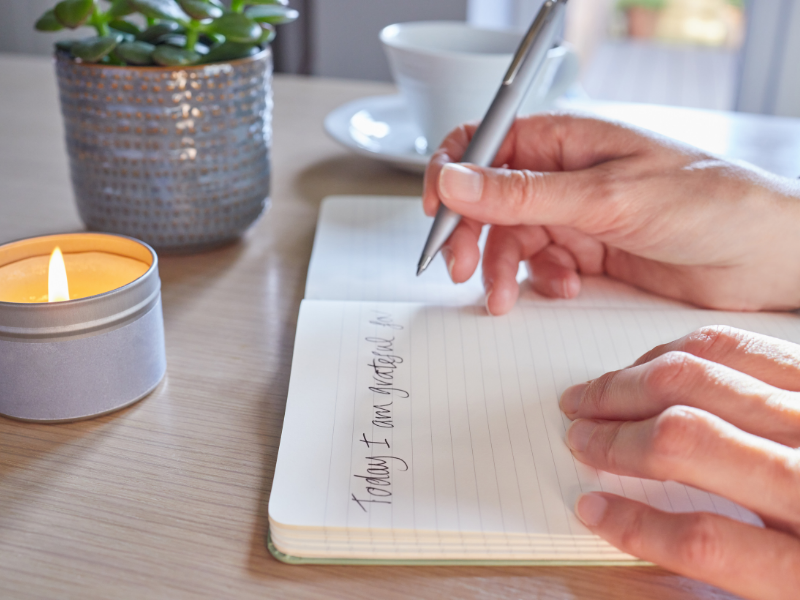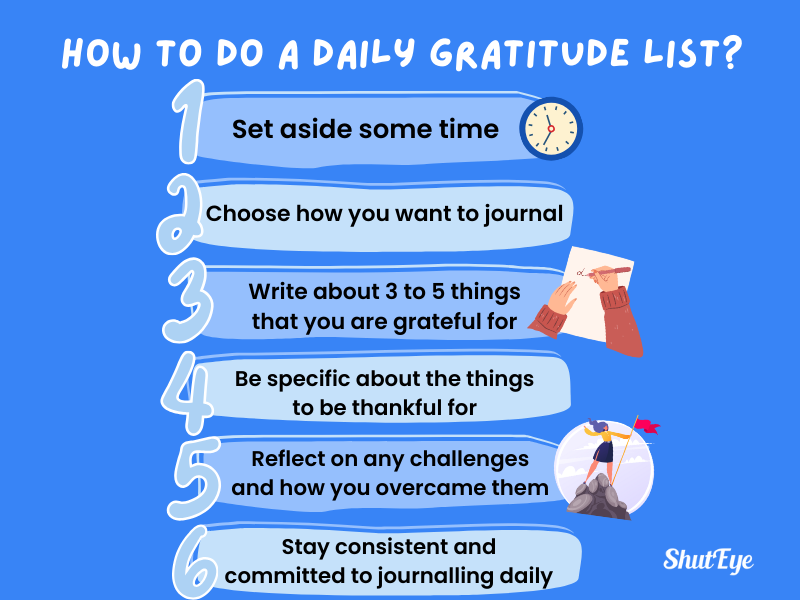


As the years go by, our worries seem to increase more than ever. In today’s society, inflation is one of the biggest worries, resulting in a chase for money [1]. As we get too caught up in the rat race, we tend to forget about being grateful for what we have. Yet, practicing gratitude is a huge part of self-care and leading a happier life.
Keep reading to discover more about gratitude and understand why it is important to practice it daily.

Gratitude can be defined as many things— a moral virtue, an attitude, a habit, a personality trait or an emotion. In a broader sense, gratitude can be defined as an appreciation for the things in life that hold meaning or value [2].
Having gratitude also means acknowledging the positive aspects of your life. It is a reminder of how fortunate you are to have access to things that maybe other people do not have.
In positive psychology, gratitude is important as it can have a positive impact on mental health and well-being. It is commonly associated with greater happiness.
Expressing more gratitude daily can foster joy and happiness in oneself and also in others.
Some of the benefits of making gratitude a daily habit include [3]:
When you start to approach life with a positive mindset and attitude, you will also start to see improvements in other areas of your life such as better sleep, increased focus, increased patience, and higher self-confidence [4].
Research suggests that gratitude influences sleep quality. It predicted greater subjective sleep quality and duration, and less sleep problems and daytime functioning.
People who practice gratitude before bed are reportedly more likely to have a positive outlook and less likely to engage in negative thoughts and behaviors. This results in better quality sleep and less sleep disturbances [5].
You may also like: Benefits of Sleep: 7 Benefits and Tips For Better Sleep

By now, we understand that practicing gratitude does bring about good benefits for our health and well-being. Yet, for some people, practicing it does not come easy.
Some reasons why it can be hard for us to feel gratitude include:
According to some studies, our genetic makeup can affect the way we feel and show gratitude. A study that explored how specific genes could affect a person’s disposition, looked at a specific gene called CD38.
It was found that a difference in this gene resulted in a difference in quality and frequency of expressing gratitude [6]. Another gene that influences gratitude is called “COMT” involved in the recycling of the neurotransmitter dopamine.
Research also suggests that our brain structure and activity can also affect the way we feel grateful. For people who feel more gratitude, some parts of the brain are anatomically different and have more gray matter in their right temporal cortex compared to those who feel less.
There are also activity differences seen in people who are more and less grateful. Thus, showing that our brain structure does play a part in the way we feel gratitude [7].
Another huge obstacle to gratitude is certain personality factors. Envy, materialism, pride, and narcissism are all factors that can influence the way we feel gratitude.
Envy is when we compare ourselves to others or desire things others have that we don’t. This envy also feeds the temptation of becoming more prideful, materialistic, and narcissistic. When we are constantly unsatisfied with what we have, it makes it harder for us to feel grateful [8].

Fostering gratitude in our everyday life takes practice. There are many ways to express gratitude to others, to yourself, to the universe, or even to a higher being.
However, one of the biggest obstacles is not knowing where to start. Here are some tips on how you can start practicing gratitude and making gratitude practice, a habit.
Beginning to practice gratitude can feel rather challenging as it requires you to pause and reflect on the moments that you are truly thankful for. Start by identifying one or two things each day that bring you joy or comfort, even if they seem small. It could be as simple as having had breakfast in the morning, waking up well-rested, or receiving a compliment from a colleague.
Focusing on these small, everyday moments will help you to realize that there is a lot to appreciate in life. Over time, you will find that it gets easier to cultivate gratitude and adopt a positive mindset.

Keeping a gratitude journal helps to remind you of all the good things that you have in your life. Whenever you feel that you are in a bad state of mind, being able to look back at this journal becomes a testimony that the negative emotions are only temporary and do not last.
Try focusing on daily gratitude journaling, writing 3 things that you feel grateful for each day. It doesn’t matter if it is something small or big. What is more important is staying consistent for improved health and happiness [9].
Beginning each day with a positive thought can help to set the tone for the rest of your day. If you have a long day ahead of you, it’s understandable that it may be hard to stay positive.
However, this is where you should try to adopt a shift in mindset and look for a silver lining. For example, “It could be a long day but at least I’ll have a good meal at lunch today”. Making this a habit can help you to stop ruminating.
Expressing gratitude to others should also be made a daily habit. Fostering positivity is not just about the way that you speak to yourself but also how you speak about others. If you want to surround yourself with more positive energy, then it’s about taking the time to show appreciation for others.
Whether it is writing letters to your loved ones, or having a heartfelt conversation, all of these can strengthen relationships and create positivity.
Incorporating mindfulness into your daily gratitude practice is about being fully aware of the present moment and things that are a blessing.
Try to put aside a few minutes of your day to just slow down and pay attention to the details in your surroundings. What are the things that you can see, feel, hear, smell and taste in that moment?
By practicing mindfulness, you can deeply experience and appreciate the present moment without distraction. It helps you to acknowledge things that can bring you joy.

Creating a daily gratitude list is a powerful way to cultivate a healthy and positive mindset. Here are some steps on how you can get started:
See also: 100+ Gratitude Quotes to Express Our Appreciation
Practicing daily gratitude can have a profound impact on your mental health and well-being. It can lead to more happiness and gratefulness for what you have in your daily life. It can also help you to improve your sleep quality and have fewer sleep problems.
If you have problems getting good sleep at night, give the ShutEye® app a try. ShutEye® helps improve your sleep by tracking your sleep patterns and providing personalized insights to improve your rest.
Allen, S. (2018) Why Is Gratitude So Hard for Some People? [online]. Available at: https://greatergood.berkeley.edu/article/item/why_is_gratitude_so_hard_for_some_people
Algoe, S. B., & Way, B. M. (2014). Evidence for a role of the oxytocin system, indexed by genetic variation in CD38, in the social bonding effects of expressed gratitude. Social cognitive and affective neuroscience, 9(12), 1855–1861. Available at: https://doi.org/10.1093/scan/nst182
Arrien, A. (n.d.) Obstacles to Gratitude [online]. Available at: https://grateful.org/resource/obstacles-to-gratitude/
Harvard Health Publishing (2021) Giving thanks can make you happier [online]. Available at: https://www.health.harvard.edu/healthbeat/giving-thanks-can-make-you-happier
Haupt, A. (2023) How to Actually Stick to a Journaling Routine [online]. Available at: https://time.com/6266437/journaling-routine-health-benefits/
Ipsos (2024) What Worries the World – July 2024 [online]. Available at: https://www.ipsos.com/en-th/what-worries-world
Reid, S. (2024) Gratitude: The Benefits and How to Practice It [online]. Available at: https://www.helpguide.org/mental-health/wellbeing/gratitude
Sansone, R. A., & Sansone, L. A. (2010). Gratitude and well being: the benefits of appreciation. Psychiatry (Edgmont (Pa. : Township)), 7(11), 18–22.
Wood, A. M., Joseph, S., Lloyd, J., & Atkins, S. (2009). Gratitude influences sleep through the mechanism of pre-sleep cognitions. Journal of psychosomatic research, 66(1), 43–48. Available at: https://doi.org/10.1016/j.jpsychores.2008.09.002